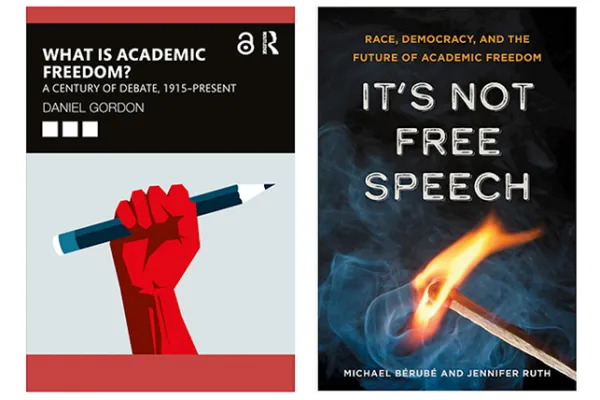What Is Academic Freedom? Fundamental Debates and Reconsiderations
Published December 21, 2022
‘What’s Wrong with Academic Freedom?’
Public lecture Monday, March 6, 4:30 - 6 p.m., Seelye 201
Michael Bérubé and Jennifer Ruth will discuss their new book, “It’s Not Free Speech: Race, Democracy and the Future of Academic Freedom.” The protests of summer 2020, which were ignited by the murder of George Floyd, led to long overdue reassessments of the legacy of racism and white supremacy in both American academe and cultural life more generally. But while universities have been willing to rename some buildings and schools or grapple with their role in the slave trade, no one has yet asked the uncomfortable question: Does academic freedom extend to racist professors?
A Kahn Institute Short-Term Project
Fellows will meet February 27 and March 6, 2023, 4:30-8:30 p.m.
Organizing Fellows
- Justin Cammy, Jewish Studies and World Literatures and
The Committee on Academic Freedom
- Shannon Audley, Education & Child Study
- Nicholas Howe, Computer Science
- Mehammed Mack, French Studies
Project Description
The topic of academic freedom is frequently in the news and is the subject of countless op-eds. But what have been the fundamental and recurrent issues since the American Association of University Professors issued its famous "General Declaration of the Principles of Academic Freedom and Tenure" in 1915?
How can we comprehend academic freedom analytically rather than polemically? This mini-Kahn project does not aim to defend any particular definition of academic freedom. Instead, we seek to raise the level of conceptualization of major controversies and issues by drawing on history, law, and philosophy in a manner that will be intriguing and relevant for professors across the disciplines.
This Kahn Institute short-term project will feature scholars who have written two new books on academic freedom:
Daniel Gordon, author of What Is Academic Freedom? A Century of Debate, 1915-Present (Routledge, 2022; open access through Knowledge Unlatched).
Professor Gordon will guide participants through one of the most persistent and intractable questions concerning academic freedom over the past 100 years through a set of case studies: What is the relationship between academic freedom and freedom of speech?
Michael Bérubé and Jennifer Ruth, authors of It’s Not Free Speech: Race, Democracy and the Future of Academic Freedom (Johns Hopkins, 2022).
Professors Bérubé and Ruth will explore how far the idea of academic freedom should extend in an age of racial reckoning. They suggest that college faculty should adopt and enforce academic freedom policies that distinguish the broad definitions of the First Amendment from a new definition of academic freedom for the public good. Moreover, they explore how adjudication of disputes over academic freedom might be reviewed more effectively by a panel of fellow faculty rather than by administrators.
Daniel Gordon is a professor of History at UMass Amherst and coeditor in chief of the journal Social Science and Modern Society. He is the author of What Is Academic Freedom? A Century of Debate, 1915-Present (Routledge, 2022); Citizens Without Sovereignty: Equality and Sociability in French Thought, 1670-1789 (Princeton UP); translator of Voltaire’s Candide (Bedford St. Martins Press, 2001, 2016); and editor of The Anthem Companion to Alexis de Tocqueville (Anthem Press, 2019) and Postmodernism and the Enlightenment (Routledge 2001). From 2009–2015 he served first as associate dean and then interim dean (from 2013) of the Commonwealth Honors College. He received a Ph.D. in History from the University of Chicago and a Master of the Study of Law degree from Yale Law School.
Michael Bérubé is Edwin Erle Sparks Professor of Literature at Pennsylvania State University. He is the author of eleven books to date, including Public Access: Literary Theory and American Cultural Politics (Verso, 1994); What’s Liberal About the Liberal Arts? Classroom Politics and “Bias” in Higher Education (W. W. Norton, 2006). He has also published two edited collections, Higher Education Under Fire: Politics, Economics, and the Crisis of the Humanities (Routledge, 1995; with Cary Nelson) and The Aesthetics of Cultural Studies (Blackwell, 2005). In 2015 he published The Humanities, Higher Education, and Academic Freedom: Three Necessary Arguments, co-authored with Jennifer Ruth (Palgrave). In 2022, Johns Hopkins University Press published his second collaboration with Jennifer Ruth, It’s Not Free Speech: Race, Democracy, and the Future of Academic Freedom. He served three terms on the American Association of University Professors’ Committee on Academic Freedom and Tenure from 2009 to 2018. In 2012 he was president of the Modern Language Association.
Jennifer Ruth is Professor in the School of Film at Portland State University. A member of the AAUP’s Committee on Academic Freedom, she writes on higher education issues for the Academe blog. She is the co-author, with Michael Bérubé, of The Humanities, Higher Education, and Academic Freedom: Three Necessary Arguments (2015) and It’s Not Free Speech: Race, Democracy, and the Future of Academic Freedom (2022). Before moving to the School of Film in 2015, Ruth taught critical theory, cultural studies and the Victorian novel in the English department at Portland State University. Her book, Novel Professions: Interested Disinterest and the Making of the Professional in the Victorian Novel, was published in 2006.
